- Home
- Patricia Hickman
Whisper Town Page 16
Whisper Town Read online
Page 16
“I visited your minister this afternoon,” said Jeb.
“My mother’s minister.” She laughed. “I don’t guess I have no minister. What’s wrong anyway, is Lucky in trouble?”
“I hate to see her taking care of a baby at her age. Sure be nice to find the mother.”
“What did Louie Williamson tell you?”
“Nothing. I told him I wanted to speak with you. He sent me here.”
“Where I go is none of that man’s business. He thinks he knows me.”
“Maybe he does.”
“He blames me for Lucky’s problems. But I ain’t the blame. Ruben, he’s as much at fault as anyone.”
“Your brother is Ruben. Where does Ruben live?”
“He stay at our mother and father’s house. They spoil that boy.”
“Why Ruben? Why is he to blame?”
“After Daddy made me leave, he thought he got rid of all the family trash. That’s what he calls me. One night Ruben and Lucky stayed up late. Momma and Daddy went off to some church social or bingo night or whatever it is they do. Lucky got into Ruben’s stuff he keeps under his bed. Case of beer, maybe some whiskey.”
Jeb acknowledged Harry, who waved him over.
“Daddy and Momma come home, they found Lucky sick. She was throwing up and drunk. She had messed up the house but good. Daddy screamed. Momma started crying. Ruben never said nothing. He didn’t say where she got the stuff. They acted like I give it to her. I still hate him for it.”
“So Lucky got kicked out of the house.”
“Kicked herself out. Daddy whipped her. She got up and said things she says she can’t remember. Daddy made Ruben drive her to my place. He dropped her off without telling me what happened or how I was going to support her. Lucky said that after a few days Daddy would send Ruben for her.”
“Did he?”
“He might have. Things got worse, though. They’re waving at you from the bandstand.” Jewel pushed away from the table. “Reverend, I know you think you know some things about my family. Things is not how they seem, though, and that’s all I can say.”
“Is there anything else you want to say, Jewel?”
“Talk to Ruben. Not at my folks’ place, though. They think Lucky’s still with me. If you can help it, it’s best you not cause us that kind of trouble.” She walked away.
Jeb slipped around behind the bandstand and grabbed his banjo. “Harry, I’ve got to check on some things. Good playing with you.” Jeb slipped out the back door.
19
JEB CAME TO THE BREAKFAST TABLE FEELING like he could read the inside of his eyelids. He had driven around Hope for an hour after he had left the club, until a deputy who saw him circling through the colored section of town stopped him and questioned him. The white cop didn’t know of a John Blessed, and even if he did, he wouldn’t give out that kind of information to a complete stranger. He told Jeb to go home.
Angel served eggs and toast to Ida May. Willie sat opposite Ida May and next to Lucky. Lucky wiped dried milk from Myrtle’s face. None of them said a word to Jeb.
He poured a cup of coffee and asked Ida May to send the butter dish his way. His grits needed flavoring.
“We ate supper without you last night,” said Willie.
Ida May stared at him.
“I had to call on some people,” said Jeb.
“Church people, right, Jeb?” asked Willie.
Angel scraped the last of the eggs onto Jeb’s plate. “It’s none of our business.”
“Angel thinks you’ve gone back to your old ways, Jeb,” said Willie. “Tell her that’s nonsense.”
“That’s nonsense,” said Jeb. He wanted to crawl back into bed.
Ida May held her milk glass in front of her, licking the white off her upper lip.
“Someone want to tell me why you’re all acting like you shot someone and buried them out back?” asked Jeb.
“Reverend, last night you came in smelling like my brother, Ruben,” said Lucky.
“Meaning what?” asked Jeb.
“Ruben goes out playing poker and smoking cigars with his friends on Friday night.”
“Did I smell like cigars?”
Ida May nodded.
“I shouldn’t have to explain myself. I’m a grown man.”
“If you slipped up, I won’t tell Sister Bernard, Dub,” said Ida May.
“I didn’t slip up, all of you. Sometimes a preacher has to see folk and they aren’t the kind of people we might see like everyday folk. Jesus hung out with the sinner and publican.”
“You was with a Republican?” asked Willie.
“I went to see your sister, Lucky,” Jeb told her.
“Friday night? That would be the High Cotton Club,” said Lucky.
“Did you meet any floozies?” asked Willie.
“Is that a dog?” asked Ida May.
“I asked her about your family, Lucky. You live here, so I check on things for your sake.”
“You spying on me, Reverend?”
“So, last night the Church in the Dell preacher went honky-tonking,” said Angel. “That’s a fine how-do-you-do.”
“Don’t you go spreading personal business, Angel,” said Jeb.
“They got a band on Friday night,” said Lucky.
“Gospel?” asked Willie.
“Jazz. R-really good jazz. Lucky, for the record, I wasn’t spying.” Jeb gave his eggs to Ida May.
“Miss Coulter came by to see you last night. We tried to tell her that you were probably out visiting sick people. She wanted to know what sick people,” said Angel. “Willie said he didn’t know of any sick, so I elbowed him. Miss Coulter might have been vexed when she left.”
“In Sunday-school class Sister Bernard says that God gets vexed,” said Ida May. “Is it over cigars and poker?”
Jeb said, “I’m going to clean up and go and see Miss Coulter. I don’t want any of you talking out of turn to anybody about anything we’ve discussed over breakfast.” Halfway down the hall he heard Ida May say, “Dub needs prayer. I’ll write it on a slip of paper for Sister Bernard’s prayer box. She says it’s very private. No one reads the notes but her and God.”
“She said I was vexed?” Fern wiped down the inside door of her car. She swallowed and added, “I am curious about where you went.”
“I have a hunch about Myrtle. I think the Blesseds know whose baby she is.”
“Why would they hide it?”
“To protect the mother.”
“You think it’s Jewel Blessed.”
“I can’t prove it. She acted funny about the baby last night. Her father knows something and I think the girls’ brother, Ruben, may know too.”
“When will you talk to Ruben?”
“I hope Jewel tells him I came by. If I talk to John Blessed, it could cause trouble for the girls.”
“I got a letter from my mother. She is lining me up a teaching position in Ardmore.”
“You told her to do that?”
“Mother does these things on her own. She did tell me to bring you along.”
“Is she lining up a job for me too?”
“Is that a yes?”
“Does she know how many children come with the package?”
Fern closed up her car and set the rags aside. “Jeb, I’m scared.”
“You’ve never said that before.”
“What’s going to happen, Jeb? Is something going to take you away from me for good?”
“I’m not afraid, Fern.”
Fern picked up a rock. She hefted it and then pitched it mean over the surface of Long’s Pond. The stone skipped three times and dropped into the icy water. She kept staring at the place where it sank, like she willed the bitter depths to cough up what had been swallowed.
She could be packed for Ardmore in two shakes. She said it twice. They would be in Oklahoma by Tuesday.
Jeb listened. The slander would dry up and blow away. He would not have to look into the eyes of a disappro
ving congregation tomorrow, some forever insouciant while others questioned his stability as a minister. Both kinds made him want to throw off polite decorum and kick aside the petty notions that kept otherwise faithful people distant from one another, from others that could give them a different view of things. “I’ve a little more studying to finish. Sunday’s coming,” he said.
“I’m with you, my beloved.”
Jeb turned toward town instead of home. He drove past Beulah’s and smelled the deep-oil-fried chicken livers, her Saturday special, seeping out of the cafe to entice hungry men to step inside and give up a half-dollar for crunchy poultry organs with a side of gravy-smothered potatoes.
His mother cooked like Beulah, knowing what would be served on any particular day of the week. Monday meat loaf. Tuesday turnip greens and salt pork. He had never noticed before the alphabetical connotation of his mother’s cooking. Wednesday wieners and sauerkraut, her version of it anyway; cook cabbage until it melts into the substance of seaweed and then salt it to death.
He wondered if Nazareth would have a smell at all if Beulah closed up shop. Then the smell of popcorn wafted into the cab. Kids lined up downtown for the picture show; the Ritz always ran a month behind the rest of the country’s moving-picture runs. He did not recognize the title, but underneath it in straight black letters spelled out The Marx Brothers.
Neither Willie nor Angel had asked for picture show money in months, not since Myrtle and Lucky had come to stay under their roof. Their habit of adjusting to change had followed them all the way from Snow Hill.
Jeb drove past the Ritz and out of town. The sky grayed and the only hint of remaining color streaked across the horizon like pale chalk, a long trail of faded pink followed by splatters and dashes of clouds that were rosed underneath by sinking daylight.
He followed the naked tree line over the railroad tracks, past Belinda’s old abandoned shack, and beyond the weathered Tempest’s Bog sign. The cold had chased the old men’s spit-and-whittle club indoors. The evacuated railway terminal looked even more weathered; the overhang posts leaned eastward, giving the building a look of listing in the wind.
Two cars and a wagon parked in a slanted row in front of the church. A man with graying hair, full around the back and thin on the top, stuck a key in the front door, turned the lock, and then put on his hat. His eyes lifted and met with Jeb’s.
Jeb parked the truck next to the wagon and met the man at the foot of the church house steps. He introduced himself.
“Reverend Nubey, I’m Reverend Joe Cornell.” He kept walking toward his automobile as though he had no intention of stopping to chat.
“Is this your church?”
“It’s God’s church. I oversee the flock as shepherd, if that’s what you’re asking. Overseer and under shepherd, that’s who I am.”
Jeb tried not to demonstrate impatience, so he lowered his voice. “If I may walk you to your automobile, I’d like to ask you something.”
“If it’s not found in the Holy Scriptures, I don’t have the answer. Who you see before you is nothing but a small instrument of the Lord. I am God’s piccolo.”
“I know that people talk, Reverend Cornell, and I’ve been trying to put together a mystery. It’s been troubling me for some time.”
“Take your troubles to the Lord, Reverend.” He opened his car door.
“Have you heard any rumors about Lucky Blessed or her sister, Jewel, anything that has to do with a baby?”
Cornell lowered his body into the car, holding his back as though it would give out. Jeb helped him into the driver’s seat. “If you know of anything at all that would help me find this baby’s family, I’d be grateful.”
“God give you a child. You ought to thank him.”
“Myrtle is not mine to take.”
“Reverend, the only thing I can give you is a little advice.” His voice lost a trace of pulpit bravado and he looked into Jeb’s eyes. “You keep looking in my backyard, Tempest’s Bog’s backyard, for the answer. I say as kindly as I know how that you should try your own backyard. The answer is waiting to be found.”
Cornell held the door out only so that Jeb could move aside. He closed the door and gunned the engine. The car backfired. Cornell closed his eyes and smiled. He patted the steering wheel like a man coaxing life from an old dog, threw the car into reverse, and drove away.
20
ANGEL SEWED SEVEN NEW BUTTONS DOWN THE front of a dress. The dress was a printed yellow-and-green pattern, so the blue buttons replacing the old wooden ones gave it a new look. She tried it on and looked at herself in front of the parlor mirror. The dress was made for spring and suited for Sunday, not a winter garment, but worth salvaging from the rag bag for the first warm day. Even in the dead days of winter, those warm days cropped up, even if few. Angel smoothed the seams around her waist and hips and then smiled at the way it fit her, the snug waistline hugging her slender middle.
Lucky stood behind her with her arms folded. “It’s not your size and it’s for an older girl anyway.”
“Maybe you think it’s your size, Lucky.”
“Might be my size, but it’s too big for you. Look how it hangs off your shoulders. My mother was good at fitting dresses to me and my sister. We never had to go around with our things too big for us.”
The girl working for Freda at Woolworth’s might lose her job if her husband took a job out of town, so Angel wanted to be the first in line to ask about it and this dress had the look of that shop clerk, the smart look of a Sears and Roebuck Catalog girl. “I’ll need shoes to go with it.” Her hair had grown past her shoulders and browned darker in the winter. She pulled it up in back and held it until the length disappeared. “Maybe I’ll crop my hair.”
This made Lucky laugh. She plopped into Jeb’s chair, scooting aside his pen and paper with the ragged toe of her shoe.
Angel pulled her hair around and examined the ends that split into soft, fine strands. “If I get a job at Woolworth’s, I’ll save a little so I can go for a real haircut at the Clip and Curl.”
“I’ll cut your hair. Why do white girls always complain about their hair, like if it’s long, they want it short, or if they cut it off, they want to grow it back long?”
“Can you cut hair?”
“I’ll give it a try.”
“Lucky, either you know how or you don’t.”
“I’ll cut it off if you want and you can pay me by giving me that dress, since it’s too big anyway.”
Angel unbuttoned the dress and let it drop to the floor, where she gathered it up and straightened it out, tripping clumsily on the rug in her haste to keep it from Lucky’s grasp. “You can go through the rag bag at the church whenever you like. I found this one, sewed new buttons on, so it’s mine.”
“That rag bag is only for poor white trash, not black. When that lady, that Josie lady put her things in the bag, she saw me standing there and she picked it up and looked around until she saw you. She said, ‘Oh, there’s Angel!’ and then she carried that bag over to you, like she didn’t want me touching her castoffs. If she was going to give you the dress, I don’t know why she didn’t go on and give it to you. It’s like she wants everyone to see her giving her things to charity.”
“Poor white trash is not what Josie thinks of me! I think you’re jealous.”
“I ain’t jealous of anything that woman gives away.” Lucky kept rubbing the tip of a strand of her hair between her fingers, smoothing the ends and feeling the slapdash knots she had pinned around the crown of her head.
Angel pulled on the old blouse she had worn to school—faded blue cotton, long-sleeved and warm—buttoned it up, and slipped into her trousers. “So to make you happy, I should give you the dress and cut off my hair.”
“I said I don’t want nothing that belonged to Josie Hipps.”
Angel pulled out a pair of scissors. “Cut my hair then.” She dared her.
“I ain’t afraid to cut off your hair. You spiting yourself?”
“I don’t think you’ll do it.”
Lucky took the scissors from Angel’s hand and opened them over a large hank of her hair.
“What are you two doing?” Jeb entered the house through the kitchen.
Lucky sliced through Angel’s hair and handed the cutoff strand back to her. “Here’s your hair then.”
“Have you lost what good sense God gave you?” Jeb asked.
“You are jealous!” The strand dropped out of Angel’s hand.
“Angel wanted her hair cut, so I cut it.”
Angel stared into the mirror at the right side cut just below her ear. “I’m a freak.”
“I’ll cut the other side so both sides match,” said Lucky.
Jeb kept looking at the small pile of brown hair on the floor and then at Lucky.
Lucky stopped laughing.
“I can’t trust you, Lucky, not for a day,” said Jeb, mad as a hornet. “This is what people expect, shenanigans like this, and here you go and give them the ammunition they’ve been wanting.”
Lucky ran out of the house, around the east side, past the window, and disappeared into the woods.
Angel and Jeb followed her as far as the porch. Angel pulled on her coat. “That wasn’t the thing to say, Jeb,” she said. She gave the scissors to Jeb. “This is great, just great. I can’t see her going too far. Lucky don’t like those woods.” She grabbed an extra coat and took off after her.
Angel regretted not having brought the lantern, but the moonshine along the streambed led her a good ways. Lucky made enough noise to keep Angel moving not far behind; the thump of a stone kicked by her foot, the swish of brush. Angel had known that wood’s path for so long, she followed it as well as the path from the kitchen to the outhouse. She heard tell of having the second sight and thought about how finding her way in the dark might be that gift. Her toe hit a boulder. She stumbled sideways and then, flailing her hands in front of her, scraped her hands in thorny shrubbery. She thought of calling out to Lucky to stop making her run after her in the dark. But if Lucky had thought about stopping to rest, then hearing a plea from Angel might give her reason to keep running for spite. Lucky had had her way for too long in Angel’s family and it had spoiled her.

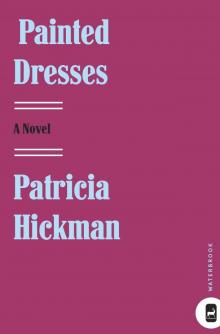 Painted Dresses
Painted Dresses The Pirate Queen
The Pirate Queen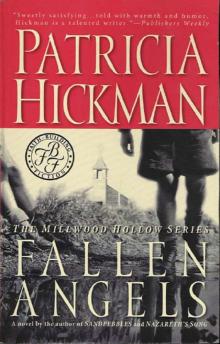 Fallen Angels
Fallen Angels Earthly Vows
Earthly Vows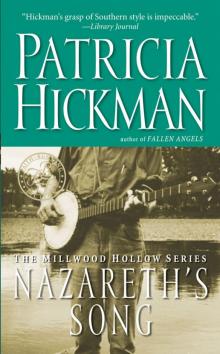 Nazareth's Song
Nazareth's Song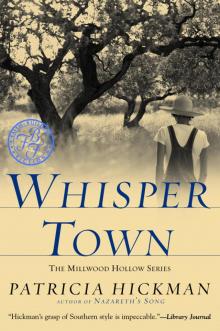 Whisper Town
Whisper Town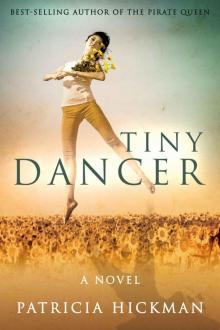 Tiny Dancer
Tiny Dancer